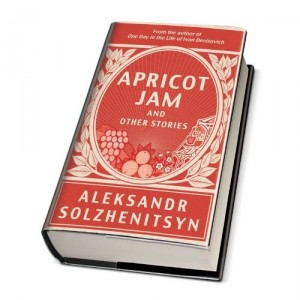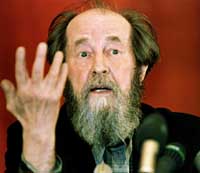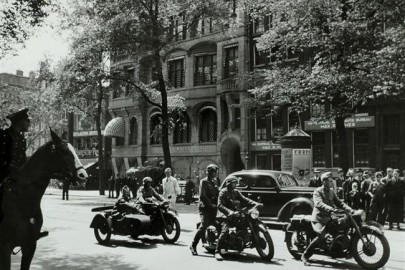 Introducing our Dabbler Book Club choice for October…
Introducing our Dabbler Book Club choice for October…
Our Dabbler Book Club choice for this month is Apricot Jam by Aleksander Solzhenitsyn. Book club members have the chance of an exclusive preview of this newly-translated collection of short stories by a Russian master, which is to be published in the UK in November.
The Dabbler’s own Daniel Kalder has already read a copy. Below he tells you why you really should read it too.
When I first moved to Russia I set myself the goal of getting to grips with the titans of Russian literature. Ultimately I would spend six years reading primarily Russian authors, but in those early days the prospect of battling my way through all those massive texts seemed intimidating, the reading equivalent of crossing Siberia on foot.
One author I was especially intimidated by was Aleksandr Solzhenitsyn, at least in part because the book I had brought with me from Scotland was Cancer Ward. I mean, why didn’t I bring Ivan Denisovich? That book was about the GULAG yes, but it was very short. Cancer Ward was about cancer AND Stalinism AND it was 560 pages long. Hey, why not read The Master and Margarita instead? It’s got the devil in it!
So I read Bulgakov’s book and thought it was only so-so. About a year later, I finally steeled myself to pick up Cancer Ward. And to my astonishment, I discovered that this “heavy” novel about Oleg Kostoglotov (“bone chewer”) an ex-political prisoner receiving treatment for cancer in a Central Asian hospital was actually a no-holds-barred, white-knuckle thrill ride! Well, not exactly, but I carried the book with me everywhere, reading it on public transportation and on park benches- it was that difficult to put down.
The back cover blurb on my (Cold War era) edition stated that it was a “metaphor for a society afflicted with a deadly cancer”… or something like that. Hmm: that Cancer Ward might be a long-winded allegory for the obvious evils of the USSR was one of the things that had put me off reading it for so long. In fact, the book is so much more than mere allegory. I was startled by the frank descriptions of the erotic longings of the sick and dying, the poignant stories of the randomly doomed and redeemed, and especially by the more or less sympathetic portrait of Rusanov, the Stalinist lackey now adrift in the Khruschev era. Solzhenitsyn used his fiction not to condemn, but to understand. There were no simplistic categories of good and evil in Cancer Ward; rather Solzhenitsyn presented a rich, polyphonic study of a complex historical moment in microcosm.
Over the years I read other books by Solzhenitsyn and each time admired not only his ability to construct intricate fictional labyrinths featuring vast casts of characters but also his humaneness, his profoundly sympathetic readings of other people. And now, in late 2011, a new book, Apricot Jam, sits on my desk containing the first English translations of stories he wrote after his return to Russia in 1993 already an old man, and largely written off by many as an irrelevant, allegedly anti-Semitic dinosaur.
It’s a pity that this myth endures because it undoubtedly prevents some people from experiencing some great literature. Solzhenitsyn was always a prose architect of great skill, prone to experimenting with structure and narrative forms. He referred to the stories in Apricot Jam as “binary,” each tale in the book being a juxtaposition of two separate halves, linked by theme or character. However these halves are frequently separated in time and space, or are written from radically different points of view. The gap between the linked stories is crucial to their overall meanings; that which goes unsaid contains as much meaning as that which is written.
Almost all of the stories are set during crisis points of soviet/Russian history: the Civil War, collectivization, or World War II. Towards the end, Solzhenitsyn even writes two stories which bleed into perestroika and the early 1990s period of bandit capitalism. Perhaps the best example of the binary technique however is a story called Times of Crisis, the first half of which is written from the perspective of a young soldier in the Civil War named Yorka Zhukov, who enthusiastically supports cruel reprisals against enemies of the Bolsheviks, including civilians. Reading it I wondered: Is this a portrait of Marshal Zhukov, the soviet war hero? Part II revealed that yes it was, as Solzhenitsyn skipped the most eventful years of the man’s life to depict Zhukov forty years later, an old man, sitting in his dacha, struggling to write his memoirs. The contrast between the virile young killer and the decrepit old war horse, grappling with his downfall in the post-Stalin era, and then feebly surrendering to the demands of his editors to write agitprop is at once biting and profound. By telling a made-up story about how Zhukov’s “factual” memoirs came to be so compromised and worthless, Solzhenitsyn ironically reveals that which their author sought to conceal. Via fiction he interrogates history, and reveals truth.
Solzhenitsyn always did this with his fiction and yet he never forgot that he was writing stories, which had to be engrossing, and entertaining, and moving. Apricot Jam reveals that even in old age, Solzhenitsyn remained a writer of great power and skillfulness.
____________________
But what will you make of it? We have 10 copies to give away to members of the Dabbler Book Club, and 2 extra copies for members of the League of Dabblers.
How to get a free copy of Apricot Jam
If you are already a member of the Dabbler Book Club you will automatically be entered into the draw. If you haven’t already joined, all you have to do is sign up below. It’s free.
After that, you don’t have to do anything. All members will be automatically entered into the ballot for one of 10 free review copies, which will take place on Monday 24th October. We’ll email the winners, at which point you can opt out if you really don’t want that month’s choice and would rather another member got the chance.
See more information about the Dabbler Book Club here. Two copies are set aside exclusively for members of the League of Dabblers, so they will have a greater chance of winning.
We’ll be reviewing Apricot Jam next month, and you can contribute your thoughts (though you’re not obliged to.)
***
Coming soon – more reviews, prize draws, signed copies, exclusive previews and more…
Over the coming months we’ve got some great literary giveaways exclusively for the Dabbler Book Club, including free copies, tickets to literary events and much more.
[contact-form 2 “Contact form 1_copy”]











I read Ivan Denisovich at secondary school and can still imagine the vile tastelessness of his fishbone-infested watery soup. I recall it being what he lived for, which made it even more disgusting. I’m glad I read it then as I think it must have helped inoculate me against having any intimation of a friendly thought towards the Soviet system.